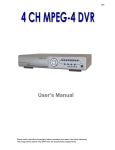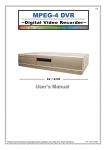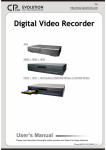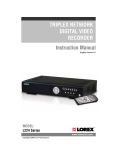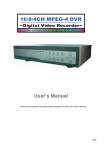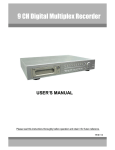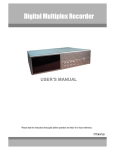Download User`s Manual - Security Alarm Shop
Transcript
205 User’s Manual Please read instructions thoroughly before operation and retain it for future reference. The image shown above may differ from the actual product appearance. ENGLISH 782, 781, 760, 761, 502, 501, 560, 561_V1.0 IMPORTANT SAFEGUARD CAUTION RISK OF ELECTRIC SHOCK CAUTION: To reduce the risk of electric shock, do not expose this apparatus to rain or moisture. Only operate this apparatus from the type of power source indicated on the label. The company shall not be liable for any damages arising out of any improper use, even if we have been advised of the possibility of such damages. The lightning flash with arrowhead symbol, within an equilateral triangle, is intended to alert the user to the presence of uninsulated “dangerous voltage” within the product’s enclosure that may be of sufficient magnitude to constitute a risk of electric shock to persons. This exclamation point within an equilateral triangle is intended to alert the user to the presence of important operating and maintenance (servicing) instructions in the literature accompanying the appliance. CE Mark This apparatus is manufactured to comply with the radio interference requirements. The company does not warrant that this manual will be uninterrupted or error-free. We reserve the right to revise or remove any content in this manual at any time. THIS PRODUCT IS LICENSED UNDER THE MPEG-4 VISUAL PATENT PORTFOLIO LICENSE FOR THE PERSONAL AND NON-COMMERCIAL USE OF A CONSUMER FOR (i) ENCODING VIDEO IN COMPLIANCE WITH THE MPEG-4 VISUAL STANDARD (“MPEG-4 VIDEO”) AND/OR (ii) DECODING MPEG-4 VIDEO THAT WAS ENCODED BY A CONSUMER ENGAGED IN A PERSONAL AND NONCOMMERCIAL ACTIVITY AND/OR WAS OBTAINED FROM A VIDEO PROVIDER LICENSED BY MPEG LA TO PROVIDE MPEG-4 VIDEO. NO LICENSE IS GRANTED OR SHALL BE IMPLIED FOR ANY OTHER USE. ADDITIONAL INFORMATION INCLUDING THAT RELATING TO PROMOTIONAL INTERNAL AND COMMERCIAL USES AND LICENSING MAY BE OBTAINED FROM MPEG LA, LLC. SEE HTTP://WWW.MPEGLA.COM. Note: Firmware Version: 1069-10-J6-04-AA-11; AP Version: 1049 Note: For any changes of AP, please refer to your distributor. Note: Any changes of this manual are subject to the actual product without further notification. TABLE OF CONTENTS PARTS AND FEATURES 1.1 1.2 1.3 1.4 1.5 1.5 1.5 1.5 FEATURES ------------------------------------------------------------------------------------------------------------------------PACKAGE CONTENTS --------------------------------------------------------------------------------------------------------SPECIFICATION -----------------------------------------------------------------------------------------------------------------FRONT PANEL -------------------------------------------------------------------------------------------------------------------REAR PANEL (Model 1) -------------------------------------------------------------------------------------------------------REAR PANEL (Model 2) -------------------------------------------------------------------------------------------------------REAR PANEL (Model 3) -------------------------------------------------------------------------------------------------------REAR PANEL (Model 4) -------------------------------------------------------------------------------------------------------- 1 1 2 4 6 7 8 9 GETTING STARTED 2.1 GETTING STARTED ------------------------------------------------------------------------------------------------------------- 10 BASIC OPERATION 3.1 RECORDING ----------------------------------------------------------------------------------------------------------------------- 11 3.2 PLAYBACK ------------------------------------------------------------------------------------------------------------------------- 12 DETAILED MENU CONFIGURATION 4.1 4.2 4.3 4.4 4.5 4.6 4.7 4.8 4.9 4.10 4.11 4.12 4.13 4.14 4.15 MENU TREE ---------------------------------------------------------------------------------------------------------------------MAIN MENU OPTIONS_ RECORD ----------------------------------------------------------------------------------------MAIN MENU OPTIONS_ TIMER -------------------------------------------------------------------------------------------MAIN MENU OPTIONS_ DATE --------------------------------------------------------------------------------------------MAIN MENU OPTIONS_ ADVANCE --------------------------------------------------------------------------------------ADVANCE MENU_ CAMERA -----------------------------------------------------------------------------------------------ADVANCE MENU_ DETECTION ------------------------------------------------------------------------------------------ADVANCE MENU_ DISPLAY -----------------------------------------------------------------------------------------------ADVANCE MENU_ ALERT --------------------------------------------------------------------------------------------------ADVANCE MENU_ REMOTE -----------------------------------------------------------------------------------------------ADVANCE MENU_ SYSTEM ------------------------------------------------------------------------------------------------ADVANCE MENU_ NETWORK --------------------------------------------------------------------------------------------ADVANCE MENU_ BACKUP -----------------------------------------------------------------------------------------------ADVANCE MENU_ HDD INFO ---------------------------------------------------------------------------------------------ADVANCE MENU_ EVENT LOG ------------------------------------------------------------------------------------------- ADDITIONAL OPERATION 5.1 5.2 5.3 5.4 5.5 SEARCH ----------------------------------------------------------------------------------------------------------------------------KEY LOCK -------------------------------------------------------------------------------------------------------------------------SWITCH THE N/P SYSTEM ---------------------------------------------------------------------------------------------------USB UPGRADE-------------------------------------------------------------------------------------------------------------------LICENSED SOFTWARE AP---------------------------------------------------------------------------------------------------INSTALL THE SOFTWARE AP -----------------------------------------------------------------------------------------AP BASIC OPERATION --------------------------------------------------------------------------------------------------AP ADVANCED SETTING ------------------------------------------------------------------------------------------------Network ------------------------------------------------------------------------------------------------------------DDNS ---------------------------------------------------------------------------------------------------------------MAIL ----------------------------------------------------------------------------------------------------------------FTP ------------------------------------------------------------------------------------------------------------------DVR-CAMERA SETTING -------------------------------------------------------------------------------------DEVICE -------------------------------------------------------------------------------------------------------------DETECTION ------------------------------------------------------------------------------------------------------NETWORK BACKUP & PLAYBACK ----------------------------------------------------------------------SEARCH LIST ----------------------------------------------------------------------------------------------------TIMER RECORD -------------------------------------------------------------------------------------------------DATE ---------------------------------------------------------------------------------------------------------------RECORD SETTING ---------------------------------------------------------------------------------------------ALARM -------------------------------------------------------------------------------------------------------------GENERAL ---------------------------------------------------------------------------------------------------------ACCOUNT ---------------------------------------------------------------------------------------------------------ONLINE USER INFO -------------------------------------------------------------------------------------------FILE PATH --------------------------------------------------------------------------------------------------------5.6 OPERATION VIA IE BROWSER ---------------------------------------------------------------------------------------------- 13 14 15 16 17 17 18 20 21 22 23 24 25 27 27 28 29 29 30 30 30 31 36 36 37 37 38 39 39 40 41 43 44 44 44 45 45 46 46 46 47 TROUBLESHOOTING 6.1 FAQ ----------------------------------------------------------------------------------------------------------------------------------- 48 APPENDIX #1 APPENDIX #2 APPENDIX #3 #3 APPENDIX #4 #4 APPENDIX #5 #5 APPENDIX #6 #6 INSTALL HDD ------------------------------------------------------------------------------------------------------------------PIN CONFIGURATION ------------------------------------------------------------------------------------------------------RS232 PROTOCOL ----------------------------------------------------------------------------------------------------------RECORDING TIME TABLE ------------------------------------------------------------------------------------------------COMPATIBLE USB FLASH DRIVE BRAND --------------------------------------------------------------------------COMPATIBLE HDD BRAND ------------------------------------------------------------------------------------------------ 49 51 52 53 55 56 PARTS AND FEATURES 1.1 FEATURES MPEG4 DVR Technology Compression format providing crystal clear images with real time performance Multiplex Allow live display, record, playback, backup, and network at the same time LongLong-Recording Hours: Model 1&2: 500GB can record more than 18 days. (4CH, Frame Best Quality, 30IPS) Model 3&4: 500GB can record more than 5 days. (4CH, Frame Best Quality, 30IPS) Backup Function: For model 1, support CD R/W, USB flash drives and network remote recording & backup For model 2 and 4, support image backup with USB flash drives and net work remote recording & backup For model 3, support network remote recording & backup Remote Surveillance: Support remote surveillance with licensed software AP and IE browser Web surveillance up to 5 users simultaneously Intelligent Motion Trigger Recording: With advanced motion detection function, scheduled motion detection recording (4 different adjustable factors for motion detection sensitivity) and convenient search function, customized security environments are achieved Alarm trigger recording will send alerts with images to designated e-mails and the FTP address Support pre-alarm recording (8MB) Covert Recording: A mask replaces the live image with a blank screen & the monitor shows nothing but recording is still on A/V Support: Support 2 audio-in, 1 audio-out to record sounds (Model 1 and Model 2) Support 1 audio-in, 1 audio-out to record sounds (Model 3 and Model 4) Support VGA output to monitor (optional) General: Model 1, 2 and 4 support multi-language OSD System auto recovery after power reconnected Support daylight saving function Support manual / timer / motion / alarm / network remote recording functions Watermark function ensures authentication of recorded images Support TCP/IP, PPPoE, DHCP and DDNS network connection 1.2 PACKAGE CONTENTS MODEL Model 1 Model 2 Model 3 Model 4 Digital Video Recorder ˇ ˇ ˇ ˇ Adapter ˇ ˇ ˇ ˇ Licensed Software AP ˇ ˇ ˇ ˇ External I/O Port Pin Connector ˇ ˇ ˇ ˇ Screws * 4 ˇ ˇ ˇ ˇ - ˇ ˇ ˇ Power and Data Bus IR Receiver & Transmitter ˇ Manual & Quick Start ˇ ˇ ˇ NOTE: Please check the package contents to make sure that you receive all accessories shown above. 1 ˇ 1.3 SPECIFICATION Model 1 Model 2 Video System Video Compression Format Model 3 NTSC / PAL (switchable) Frame: MJPEG ; CIF: MPEG4 Frame: MPEG 4 ; CIF: MPEG4 Video Input 4 Channels. Composite video signal 1 Vp-p 75Ω BNC Video Loop Out 4 Channels. Composite video signal 1 Vp-p 75Ω BNC Video Output Model 4 Main Monitor Output: Composite video signal 1 Vp-p 75Ω BNC Call Monitor Output: Composite video signal 1 Vp-p 75Ω BNC Frame: 720 × 480 pixels with 30 IPS〈NTSC〉 / 720 × 576 pixels with 25 IPS 〈PAL〉 CIF: 352 × 240 pixels with 120 IPS〈NTSC〉/ 352 × 288 pixels with 100 IPS 〈PAL〉 Maximum Recording Rate Adjustable Recording Speed Frame: 30, 15, 7, 3 IPS <NTSC> / 25, 12, 6, 3 IPS <PAL> CIF: 120, 60, 30, 15 IPS <NTSC> / 100, 50, 25, 12 IPS <PAL> Image Quality Setting Best, High, Normal, and Basic Hard Disk Storage HDD Quick Cleaning IDE type, ATA66, supported HDD *1 , support HDD capacity over 400GB Quick clean up the “index system” of the recorded files. 250GB under 2 seconds Manual/Timer/Motion/Alarm /Remote Recording Mode Yes Watermark 120 IPS for NTSC / 100 IPS for PAL Refresh Rate Audio I/O 2 audio inputs, 1 audio output (Mono) 16 × 12 grids per camera for all channels Motion Detection Area Motion Detect Sensitivity 4 adjustable variables with precise calculation for motion detection Yes (8MB) Pre-alarm Recording USB Interface Backup Device 1 audio input, 1 audio output (Mono) Support USB 1.1/ 2.0 flash drive Support USB 1.1/ 2.0 flash drive, CD R/W and network remote backup Support USB 1.1/ 2.0 flash drive and network remote backup 2 N/A Support USB 1.1/ 2.0 flash drive Network remote backup Support USB 1.1/ 2.0 flash drive and network remote backup Specification Continued… Model 1 Model 2 Web Transmitting Compression Format Ethernet Web Interface Remote Alarm Notification Network Connection 10/100 Base-T. Support remote control and live view via Ethernet Support licensed software AP and IE browser E-mail images, and upload images to FTP site’s specific account Support TCP/IP, PPPoE, DHCP and DDNS functions Support PELCO-D protocol IR Transmitter N/A YES Programmable with adjustable dwell time 4 inputs, 1 output Alarm I/O Digital Zoom 2X digital zoom (live mode) Key Lock Yes Video Loss Detection Yes Support up to 6 letters Camera Title Hue/Color/Contrast/ Brightness Video Adjustable Date Display Format YY/MM/DD, DD/MM/YY, MM/DD/YY, and Off Power Source DC 19V Power Consumption <42 W 10℃ ~ 40℃ (50℉~104℉) Operating Temperature Dimensions (mm) System Recovery Model 4 Motion JPEG PTZ control Dwell Time (Sequential Channel Switch) Model 3 375mm (W) × 61mm (H) × 281mm (D) 343mm (W) × 59mm (H) × 223mm (D) 345mm (W) x 68.3mm (H) x 225mm (D) System auto recovery after power reconnected VGA converter Optional Peripheral The specifications of the actual products are subject to change without further notification. 3 1.4 FRONT PANEL 1) “LED LIGHT” : HDD: HDD is reading or recording HDD Full: HDD is full. ALARM: Once the alarm is triggered TIMER: When timer recording is turned on PLAY: Under playing status REC: Under recording status 2) “MENU” : Press “MENU” button to enter the main menu. 3) “ENTER” / “SET” : Press “ENTER” button to confirm the setting. Press “SET” to change the position of the channel display. Press “▲▼◄►“ to select the channel which you would like to change. Press “+” or “-” to select the channel which You would like to show. 4) “SEARCH” : Press “SEARCH” button to enter the search menu. 5) “SLOW” : Under the playback mode, press “SLOW“ button to show slow playback. 6) “ZOOM” : Press “ZOOM” button to enlarge the picture of selected channel (under the live mode). 7) “ ”/“-”: Press “ “ button to show the 4 channel display mode. Press “ - ” button to change the setting in the menu. 8) “SEQ” / “ + ” : Press “SEQ” button to activate the call monitor function and press “SEQ” button again to escape the call monitor mode. Press “+ ” button to change the setting in the menu. 9) “ “ or “Power” : Press this button to turn on / off the DVR. (Under the recording mode, please stop recording before turning off the DVR). 4 10) “CH1 ” “CH2 ” “CH3 ” “CH4 ” : Press “1 ” “2 ” “3 ” “4 ” buttons to select the channel to display. 11) “REC” : Press “REC” button to activate the manual recording. 12) “ “ or “PLAY” : Press this button to playback the recorded data. 13) “UP / PAUSE , DOWN / STOP, LEFT / FAST REWIND, RIGHT / FAST FORWARD“ : Press “▲▼◄►“ to move the cursor up / down / left / right. Under the playback mode, press “ “ button to pause playback. Under the playback mode, press “ ■ “ button to stop playback. Under the playback mode, press “►►“ button to fast rewind. Under the playback mode, press “◄◄“ button to fast forward. SLOW ZOOM 14) “ ” or “ ”: AUDIO Press these two buttons to select live or playback sounds of the 2 audio channels. SEQ. 15) “ ” or “ ”: P.T.Z Press these two buttons at the same time to enter / exit the PTZ control mode. In the PTZ control mode, * Zoom in : Press "+" button * Zoom out: Press "-" button * Adjust PTZ angle: Press "UP, DOWN, LEFT, RIGHT" buttons 16) Press “ “ or “Power” button on the DVR front panel to shutdown. Then, press and hold “►“ first, and press “ “ or “Power” to switch to PAL system. (Press the buttons until the monitor shows video images) 17) Press “ “ or “Power” button on the DVR front panel to shutdown. Then, press and hold “◄“ first, and press “ “ or “Power” to switch to NTSC system. (Press the buttons until the monitor shows video images) 18) Press “MENU” + “ENTER” buttons on the DVR front panel to lock keys and to log in another username. 19) For Model 1, press “ ” buttons at the same time to open / close the CD WRITER. 5 1.5 REAR PANEL 2 INP UT 1 LOOP INP UT 2 4 3 1 LOOP Model 1 LOOP INP UT LOOP 3 INP UT M ONIT OR 5 12 1 CA LL 4 6 IN 2 OUT USB LINK ACT . D/ V EXT ERNAL I/O 7 LAN 9 8 DC 19V 10 11 1) 75Ω / HI-IMPEDANCE: When using Loop function, please switch to HI-IMPEDANCE. When you don’t use Loop function, please switch to 75Ω. 2) VIDEO INPUT (CHANNEL 1 - 4): Connect to video sources, such as cameras. LOOP (CHANNEL 1 - 4): Video output. 3) MONITOR: Connect to Main monitor. 4) CALL MONITOR: Connect to CALL monitor. Show the channel switch display. When the alarm is triggered, the call monitor will show the image of the triggered channel for a period of time. 5) AUDIO IN (2 audio-in): Connect to audio sources, such as cameras equipped with the audio function. When users start the recording function, the audio input will be recorded. 6) AUDIO OUT: Connect to a monitor or speaker. With 1 mono audio output from the same source. 7) D/V PORT (Digital Video Port): Connect to a VGA converter. 8) EXTERNAL I/O PORT: Insert the supplied 15PIN DSUB to this port for connecting external devices (alarm input, external alarm, PTZ camera). For detailed I/O port PIN configuration, please refer to Appendix #2. 9) LAN: Connect to Internet by LAN cable. 10) LINK / ACT LED light: When the Internet is activated, the LED light will be on. 11) POWER: Connect to the supplied adapter. 12) USB: Support USB flash drive firmware update and file backup. 6 1.5 REAR PANEL Continued… 2 3 4 75? 1 HI-IMPEDANCE 1 LOOP INPUT 1 LOOP INPUT 2 LOOP INPUT LOOP INPUT 3 4 MONITOR 5 12 1 CALL 4 6 Model 2 IN 2 OUT USB LINK ACT. D/ V EXTERNAL I/O 7 8 LAN 9 DC 19V 10 11 1) 75Ω / HI-IMPEDANCE: When using Loop function, please switch to HI-IMPEDANCE. When you don’t use Loop function, please switch to 75Ω. 2) VIDEO INPUT (CHANNEL 1 - 4): Connect to video sources, such as cameras. LOOP (CHANNEL 1 - 4): Video output. 3) MONITOR: Connect to Main monitor. 4) CALL MONITOR: Connect to CALL monitor. Show the channel switch display. When the alarm is triggered, the call monitor will show the image of the triggered channel for a period of time. 5) AUDIO IN (2 audio-in): Connect to audio sources, such as cameras equipped with the audio function. When users start the recording function, the audio input will be recorded. 6) AUDIO OUT: Connect to a monitor or speaker. With 1 mono audio output from the same source. 7) D/V PORT (Digital Video Port): Connect to a VGA converter. 8) EXTERNAL I/O PORT: Insert the supplied 15PIN DSUB to this port for connecting external devices (alarm input, external alarm, PTZ camera). For detailed I/O port PIN configuration, please refer to Appendix #2. 9) LAN: Connect to Internet by LAN cable. 10) LINK / ACT LED light: When the Internet is activated, the LED light will be on. 11) POWER: Connect to the supplied adapter. 12) USB: Support USB flash drive firmware update and file backup. 7 1.5 REAR PANEL Continued… 2 LOOP INPUT 1 LOOP INPUT 2 4 3 1 LOOP INPUT LOOP 3 INPUT MONITOR 5 6 1 CALL 4 Model 3 IN OUT LINK ACT. D/ V EXTERNAL I/O 7 LAN 9 8 DC 19V 10 11 1) 75Ω / HI-IMPEDANCE: When using Loop function, please switch to HI-IMPEDANCE. When you don’t use Loop function, please switch to 75Ω. 2) VIDEO INPUT (CHANNEL 1 - 4): Connect to video sources, such as cameras. LOOP (CHANNEL 1 - 4): Video output. 3) MONITOR: Connect to Main monitor. 4) CALL MONITOR: Connect to CALL monitor. Show the channel switch display. When the alarm is triggered, the call monitor will show the image of the triggered channel for a period of time. 5) AUDIO IN (1 audio-in): Connect to audio sources, such as cameras equipped with the audio function. When users start the recording function, the audio input will be recorded. 6) AUDIO OUT: Connect to a monitor or speaker. With 1 mono audio output from the same source. 7) D/V PORT (Digital Video Port): Connect to a VGA converter. 8) EXTERNAL I/O PORT: Insert the supplied 15PIN DSUB to this port for connecting external devices (alarm input, external alarm, PTZ camera). For detailed I/O port PIN configuration, please refer to Appendix #2. 9) LAN: Connect to Internet by LAN cable. 10) LINK / ACT LED light: When the Internet is activated, the LED light will be on 11) POWER: Connect to the supplied adapter. 8 1.5 REAR PANEL Continued… 2 1 LOOP INPUT LOOP 1 INPUT 2 LOOP INPUT 3 LOOP INPUT 3 4 MONITOR CALL 4 5 6 IN OUT Model 4 12 USB LINK ACT. D/ V 7 IR EXTERNAL I/O 13 8 LAN 9 DC 19V 10 11 1) 75Ω / HI-IMPEDANCE: When using Loop function, please switch to HI-IMPEDANCE. When you don’t use Loop function, please switch to 75Ω. 2) VIDEO INPUT (CHANNEL 1 - 4): Connect to video sources, such as cameras. LOOP (CHANNEL 1 - 4): Video output. 3) MONITOR: Connect to Main monitor. 4) CALL MONITOR: Connect to CALL monitor. Show the channel switch display. When the alarm is triggered, the call monitor will show the image of the triggered channel for a period of time. 5) AUDIO IN (1 audio-in): Connect to audio sources, such as cameras equipped with the audio function. When users start the recording function, the audio input will be recorded. 6) AUDIO OUT: Connect to a monitor or speaker. With 1 mono audio output from the same source. 7) D/V PORT (Digital Video Port): Connect to a VGA converter. 8) EXTERNAL I/O PORT: Insert the supplied 15PIN DSUB to this port for connecting external devices (alarm input, external alarm, PTZ camera). For detailed I/O port PIN configuration, please refer to Appendix #2. 9) LAN: Connect to Internet by LAN cable. 10) LINK / ACT LED light: When the Internet is activated, the LED light will be on 11) POWER: Connect to the supplied adapter. 12) USB: Support USB flash drive firmware update and file backup. 13) IR PORT: Connect the IR receiver for remote control. 9 GETTING STARTED 2.1 GETTING STARTED Connect all the devices to construct a surveillance system. 1) Install HDD: The HDD must be installed before the DVR is turned on. Please refer to Appendix #1 for HDD installation instructions. 2) Connect cameras, monitors and external devices. Please refer to “Section 1.5 Rear Panel” for connection, and Appendix#2 for pin configurations of the external I/O port. NOTE: Be sure the cameras are connected and power-supplied before the DVR is powered on. Otherwise the DVR will not be able to detect N/P system automatically. 3) Connect the AC power cord to power adapter and plug into an electrical outlet. The “ “ or “Power” LED will be on as red. Press the “ “ or “Power” button. The “ “ or “Power” LED will be on as green. It takes approximately 10 to 15 seconds to boot the system. 4) Set the date and time on your DVR. Please DO NOT change the date or time on your DVR after the recording function is activated. The recorded data will be disordered and you will not be able to find the recorded file to backup by time search. NOTE: If users change the date or time accidentally when the recording function is activated, it’s recommended to clear all HDD data, and start recording again. For the connection application, please see the illustration below for an example. Take Model 1 as an example 10 BASIC OPERATION 3.1 RECORDING The DVR offers three recording modes, manual record, event record and timer record. If power is off accidentally, recorded video files will still be still stored in the HDD. DVR will return to the original recording status after power is on again. 1) MANUAL RECORDING (continuous recording) : Recording is initiated by manually pressing the “REC” button, indicated by the sign “●” on the screen. 2) EVENT RECORDING (triggered by motion and external alarm) : When this function is activated, the recording is triggered by motion or external alarms, indicated by the sign " " (motion) or " " (external alarm) on the screen. 3) TIMER RECORDING (scheduled time) : Recording is scheduled by Timer, indicated by the sign “TIMER RECORD”. There must be at least 8192 images of recorded data for playback to work properly. If not, your DVR will stop the playback. For example, if the IPS is set to 30, the recording time should be at least 273 seconds (8192 images / 30 IPS) for the playback to work properly. When the recording function is activated, please DO NOT change the date or time on your DVR. The recorded data will be disordered and you will not be able to find the recorded file to backup by time search. NOTE: If users change the date or time accidentally when the recording function is activated, it’s recommended to clear all HDD data, and start recording again. Overwriting View If you activate overwriting mode, you will also see “-OW-” under the recording mode except the system time, available HDD capacity, recording icon and channel title. When the HDD is full under “-OW-” recording mode, the previous recorded files may be overwritten without further warning notice. Under “-OW-" mode, your DVR will clear 8GB data from the oldest for overwriting once the HDD is full. System Time 2006-MAY-12 [FRI] 16:18:43 Available Capacity of Internal HDD 302.545 GB -OW- ● Under HDD Overwriting Mode ● Under Recording Channel Title ● ● 11 3.2 PLAYBACK Press “ ” or “PLAY” button and the DVR will display the last recorded video. 1) FAST FORWARD (F.F. ) & FAST REWIND (REW): You can increase the speed for fast forward and rewind on the DVR. In the playback mode, * Press “►►“ once to get 4X speed forward and press twice to get 8X speed, etc., and the maximum speed is 32X. * Press “◄◄“ once to get 4X speed rewind and press twice to get 8X speed, etc., and the maximum speed is 32X. * The type of the recording image size (Frame or CIF) will also be shown on the screen. 2) PAUSE / IMAGE JOG: Press “ “ button to pause the current image displayed on the screen. In the Pause mode, * Press “►► “ once to get one frame forward. * Press “◄◄ “ once to get one frame rewind. 3) STOP: Pressing “ ■ “ button under all circumstances will return DVR to live monitoring mode. 4) CHANNEL SHIFT: * Display mode: Press MODE “ ” button to 4 channels display. * Full Screen Switch: Press “1 ” “2 ” “3 ” “4 ” buttons to show the full screen channels. * Channel display switch: Press “SET” to change the the position of the channel display. Press “▲▼◄►“ to select the channel you would like to change. Press “+” or “-” to select the channel you would like show. Press “ENTER” button to confirm the setting. 5) SLOW PLAYBACK: Model 1 & 2: Press “SLOW” button to get 1/4X speed playback and press twice to get 1/8X. Model 3: Press “SLOW” button to get 1/4X speed playback. 6) AUDIO: Press “ SLOW ZOOM ” or “ ” AUDIO to select either audio channel from the following 4 options: * AUDIO 1 (L) -- audio channel 1, live audio * AUDIO 1 (P) -- audio channel 1, playback audio * AUDIO 2 (L) -- audio channel 2, live audio * AUDIO 2 (P) -- audio channel 2, playback audio 12 DETAILED MENU CONFIGURATION 4.1 MENU TREE MENU TITLE RECORD TIMER DATE ADVANCE CAMERA MANUAL RECORD ENABLE EVENT RECORD ENABLE TIMER RECORD ENABLE DATE DATE: YEAR MONTH DAY HUE START HH : MM TIME: HOUR MIN SEC COV END HH : MM FORMAT: YY-M-D … REC DETECTION AREA DISPLAY LS ALERT MANUAL RECORD IPS EVENT RECORD IPS TIMER RECORD IPS TOTAL IPS SHARE TITLE DET OVERWRITE RECORD QUALITY CONT SATU DAYLIGHT SAVING RECORD IMG SIZE BRIG TITLE DISPLAY DATE DISPLAY SS EXT. ALERT HDD INFO INT. BUZZER LOSS SCREEN KEY BUZZER PLAYBACK INFO DWELL DURATION (SEC) DEDEINTERLACE MONITOR OUT OSD WATERMARK REMOTE RE ALARM VLOSS BUZZER MOTION BUZZER ALARM BUZZER SYSTEM HDD BUZZER BAUD RATE HDD NEARLY FULL (GB) HOST ID ALARM DURATION (SEC) PREPRE-ALARM NETWORK BACKUP HDD INFO EVENT LOG 13 DETECTION TIMER SERIAL TYPE TITLE DEVICE PASSWORD ID RESET DEFAULT CLEAR HDD UPGRADE AUTO KEYLOCK The USB backup function is only for Model 1, Model 2 and Model 4. The disk backup function is only for Model 1. TS LANGUAGE VERSION VIDEO FORMAT PROTOCOL RATE 4.2 MAIN MENU OPTIONS___RECORD Press “MENU” button to enter the main menu list. The default admin password is 0000. Enter the default password and press “ENTER”. (Users could alter the password later. Please refer to “Section 4.11 ADVANCE MENU_SYSTEM”) Move the cursor to “RECORD” and press ”ENTER”. The screen will show the following options. RECORD MANUAL RECORD ENABLE EVENT RECORD ENABLE TIMER RECORD ENABLE OVERWRITE RECORD IMG SIZE RECORD QUALITY MANUAL RECORD IPS EVENT RECORD IPS TIMER RECORD IPS TOTAL IPS SHARE (MENU) ► RECORD TIMER DATE ADVANCE Use the following buttons for menu settings: “▲▼◄► “ to move the cursor. “+ , -” to choose the numbers / selections. “ ENTER “ to go to the submenu / to confirm the selection “ MENU “ to go to the menu OSD / to confirm the change / to exit the menu OSD 1) MANUAL RECORD ENABLE: Start / stop the manual recording function. 2) EVENT RECORD ENABLE: Start / stop the event recording function. When this function is activated, the recording will be triggered by the motion or external alarm. 3) TIMER RECORD ENABLE: Start / stop the timer recording function. 4) OVERWRITE: Select to overwrite previous recorded videos in HDD. When the HDD is full under O/W recording mode, previous recorded files will be overwritten without further warning notices. 5) RECORD IMG SIZE: There are two recording options, FRAME and CIF. When changing the record image size, users need to stop recording first. 6) RECORD QUALITY: There are four quality settings: BEST, HIGH, NORMAL & BASIC. 7) MANUAL RECORD IPS: Recording is activated by pressing the “REC” button. Select the images per second of MANUAL RECORD, The options are as following: NTSC: PAL: NTSC FRAME: 30, 15, 7, 3 PAL FRAME: 25, 12, 6, 3 CIF: 120, 60, 30, 15 CIF: 100, 50, 25, 12 14 8) EVENT RECORD IPS: Recording is activated by events (alarm and motion trigger). Select the images per second for EVENT RECORD. The options are as following: NTSC: PAL: NTSC FRAME: 30, 15, 7, 3 PAL FRAME: 25, 12, 6, 3 CIF: 120, 60, 30, 15 CIF: 100, 50, 25, 12 9) TIMER RECORD IPS: Recording is activated by timer schedules. Select the images per second for TIMER RECORD. The options are as following: NTSC: PAL: NTSC FRAME: 30, 15, 7, 3 PAL FRAME: 25, 12, 6, 3 CIF: 120, 60, 30, 15 CIF: 100, 50, 25, 12 10) TOTAL IPS SHARE: There are two IPS settings: FIX: FIX IPS per channel = RECORD IPS ÷ 4 channels GROUP (Suitable for Frame mode): mode) IPS per channel = RECORD IPS ÷ number of channels under recording. NOTE: For Model 3 & 4, the total IPS share is always “FIX”. 4.3 MAIN MENU OPTIONS___TIMER (MENU) RECORD ► TIMER DATE ADVANCE Move the cursor to “TIMER” and press ”ENTER”. The screen will show the following options. RECORD DATE OFF DAILY SUN MON-FRI OFF OFF OFF START 00 : 00 08 : 00 06 : 00 00 : 00 00 : 00 00 : 00 00 : 00 15 - END 00 : 18 : 23 : 00 : 00 : 00 : 00 : 00 00 00 00 00 00 00 1) DATE: Select scheduled record days (SUN/MON/TUE/ WED/ THU/ FRI/ SAT/ MON–FRI / SAT-SUN / DAILY/OFF) to set up timer record schedules. NOTE 1 : Specific days could be changed by “+” or “-” button. NOTE 2 : If you plan to set the timer recording across the midnight, there are two ways for setting the timer recording schedule. Please follow the instructions below. Example 1 : If you only want to set the recording timer schedule from every Sunday 23:30 to Monday 23:30, then you could set the recording timer schedule as Sunday from 23:30 to 23:30. Example 2 : If you plan to set the timer recording from Sunday 08:00 to Monday 15:00, then you could set the recording timer schedule as Sunday from 08:00 to 24:00, and Monday 24:00 to 15:00. Note: Please turn on “TIMER RECORD ENABLE” in RECORD” menu (see P.14). 2) START: Select the start time for the recording. 3) END: Select the finish time for the recording. 4.4 MAIN MENU OPTIONS___DATE (MENU) RECORD TIMER ► DATE ADVANCE Move the cursor to “DATE” and press ”ENTER”. The screen will show the following options. Please DO NOT change the date or time when the recording function is activated. See “2.1 GETTING STARTED” at P.10 for details. DATE DATE FORMAT DAYLIGHT SAVING 2006-MAY-12 16:30:00 Y-M-D ON 1) DATE: Set the correct time of the DVR ( YEAR / MONTH / DAY / HOUR / MIN / SEC) 2) FORMAT: There are three formats: Y-M-D, M-D-Y, D-M-Y. 3) DAYLIGHT SAVING: Specify whether to use daylight saving time and time period. ( START / END) Daylight saving time can be adjusted manually. Enter the daylight saving menu mode to set the start time and the end time, and adjust hours of the daylight saving. DAYLIGHT SAVING START END ADJUST 4TH-SUN-MAR 01: 00: 00 4TH-SUN-OCT 01: 00: 00 01 : 00 NOTE: The illustrated setting means: During the daylight saving time period (start from the 4th Sunday of March, end on the 4th Sunday of October), the DVR system time will plus one hour. 16 4.5 MAIN MENU OPTIONS___ADVANCE Move the cursor to “ADVANCE” and press ”ENTER”. The screen will show the following options. ADVANCE CAMERA DETECTION DISPLAY ALERT REMOTE SYSTEM NETWORK BACKUP HDD INFO EVENT LOG (MENU) RECORD TIMER DATE ► ADVANCE 4.6 ADVANCE MENU ___CAMERA Move the cursor to “CAMERA” and press ”ENTER”. The screen will show the following options. CAMERA TITLE 01 02 03 04 BRIG 110 110 110 110 CONT 128 128 128 128 SATU 128 128 128 128 HUE 128 128 128 128 COV NO NO NO NO REC YES YES YES YES 1) TITLE: Move the cursor to the camera title you want to change, and press “ENTER” to access the setting screen. Assign each channel a title (up to six characters (letters or symbols…)). The default title is the channel number. 2) BRIG / CONT / SATU / HUE: Adjust the Brightness/Contrast/Saturation/Hue of each channel. The level is from 0 to 255. The default value of BRIG is 110. Others are 128. 3) COV (COVERT): Select “YES” to mask the selected channel which is under recording. When this function is activated, the “COV” word will be shown on the screen. 4) REC (RECORD): Select “YES” to enable the record function. Select “NO” to disable recording at all time. 5) PREV / NEXT: Select “PREV” to go to the previous page. Select “NEXT” to go the next page. 17 4.7 ADVANCE MENU ___DETECTION Move the cursor to “DETECTION” and press ”ENTER”. The screen will show the following options. DETECTION DETECTION SETUP DETECTION TIMER 1) DETECTION SETUP: DETECTION TITLE 01 02 03 04 DET ON ON ON ON AREA SETUP SETUP SETUP SETUP LS 07 07 07 07 SS 03 03 03 03 TS 02 02 02 02 RE 10 10 10 10 ALARM OFF LOW HIGH OFF a) TITLE: Show the camera title of each channel. b) DET: Select “ON” to activate the motion detection function of the selected channel. Select “OFF” to inactivate the motion detect function of the selected channel. c) AREA: Press the “ENTER” button to set the detection area. Pink blocks represent the area that is not being detected while the transparent blocks are the areas under detection. Press “ENTER” to confirm the start area Multi-detection areas Press ◄ or ► to choose the width of the area Press ◄ or ► to choose the height of the area, and press “ENTER” again to confirm. Press “-” to set the whole area under detection Press “+” to set the whole undetected 18 ▲▼◄►: Navigate between targets. d) LS : The sensitivity of comparing two different images. The smaller the value is, the higher sensitivity for motion detection. The highest sensitivity setting is 00 and the lowest sensitivity setting is 15. The default value is 07. e) SS : The sensitivity regarding the size of the triggered object on the screen (the number of motion detection grids). The smaller the value, the higher sensitivity for motion detection. The highest sensitivity setting is 00 and the lowest sensitivity setting is 15. The default setting is 03. Note: The default setting of Spatial Sensitivity is 03, which means once a object is detected more than 3 grids, the system will get triggered. So the value of Spatial Sensitivity must be less than the number of grids that you set up for the motion detection area. f) TS : The sensitivity regarding how long the object gets triggered. The smaller the value, the higher motion detection sensitivity will be. The highest sensitivity setting is 00 and the lowest sensitivity setting is 15. The default setting is 02. g) RE : The value of RE is a reference for detection. The default value is 10, which means DVR will compare 10 continuous images at one time according to the sensitivity of LS, SS, TS simultaneously. The bigger the value, the higher sensitivity for motion detection. The highest sensitivity is 61. h) ALARM: Select LOW / HIGH for the alarm polarity. The default alarm value is OFF. 2) DETECTION TIMER: Set the date, start time and end time for the detection function. DETECTION TIMER DATE OFF DAILY SUN MON-FRI OFF OFF OFF START 00 : 00 08 : 00 06 : 00 00 : 00 00 : 00 00 : 00 00 : 00 19 - END 00 : 18 : 23 : 00 : 00 : 00 : 00 : 00 00 00 00 00 00 00 4.8 ADVANCE MENU ___DISPLAY Move the cursor to “DISPLAY” and press ”ENTER”. The screen will show the following options. DISPLAY TITLE DISPLAY DATE DISPLAY HDD INFO LOSS SCREEN PLAYBACK INFO DWELL DURATION (SEC) DE-INTERLACE MONITOR OUT OSD WATERMARK ON ON ON BLUE NORMAL 2 ON MAIN SETUP ON 1) TITLE DISPLAY: Turn the channel title display on / off. 2) DATE DISPLAY: Turn the date display on / off. 3) HDD INFO: Turn the information display of internal HDD on / off. 4) LOSS SCREEN: Set the color of the video loss screen (Blue or Black) 5) PLAYBACK INFO: Set the position where playback information will be indicated (center or normal (on the button of the left-hand side of the screen)). 6) DWELL DURATION (SEC): Set the duration time of each channel for CALL MONITOR (2, 4, 8, 16 secs.) 7) DE-INTERLACE: Set the “DE-INTERLACE” function on / off. 8) MONITOR OUT: Select Select "MAIN" when the video output device is CRT monitor. Select "VGA" when the video output device is LCD monitor. Note: If the connected video output device is LCD monitor, but the setting here is "MAIN", motion detection area setting will be disabled. 9) OSD: Set the customized OSD color. 10) WATERMARK: In the playback mode of the software AP, users could proof the authenticity of the BACKUP VIDEO. If the BACKUP VIDEO had been modified, the video image will turn to light red and the playback will be paused. Please refer to P. 35 for detailed instructions. Note: This function is always on and nonnon-switchable. 20 4.9 ADVANCE MENU ___ALERT Move the cursor to “ALERT” and press ”ENTER”. The screen will show the following options. ALERT EXT. ALERT INT. BUZZER KEY BUZZER VLOSS BUZZER MOTION BUZZER ALARM BUZZER HDD BUZZER HDD NEARLY FULL (GB) ALARM DURATION (SEC) PRE-ALARM ON ON ON ON ON ON ON 05 05 OFF 1) EXT. ALERT: Set the sound on / off when the external alarm is triggered. 2) INT. BUZZER: Set the sound of KEY / VLOSS / MOTION / ALARM / HDD FULL on or off. 3) KEY BUZZER: Set the sound on / off when pressing the button. 4) VLOSS BUZZER: Set the sound on / off when any video loss happened. 5) MOTION BUZZER: Set the sound on / off when the motion alarm is triggered. 6) ALARM BUZZER: Set the sound on / off when the internal alarm is triggered. 7) HDD BUZZER: Set the sound on / off when the HDD is full. 8) HDD NEARLYFULL (GB): If HDD buzzer is on, you could choose to have a buzzer notification when the HDD available capacity is only xxx GB left. 9) ALARM DURATION (SEC): Press “ENTER” or “+” or “-” button to set the duration time of alarm recording (5, 10, 20, 40 secs.). 10) PRE-ALARM: Set the pre-alarm function on (8MB)/ off. When pre-alarm and event record functions are both activated, the DVR will record a 8MB file before any alarm / motion is triggered. 21 4.10 ADVANCE MENU ___REMOTE Move the cursor to “REMOTE” and press ”ENTER”. The screen will show the following options. REMOTE TITLE 01 02 03 04 DEVICE PTZ CAMERA CAMERA CAMERA ID 001 002 003 004 PROTOCOL P-D NORMAL NORMAL NORMAL RATE 02400 02400 02400 02400 1) TITLE: Title of each camera. 2) DEVICE: Select to control normal cameras or PTZ cameras for each channel. 3) ID: Set the ID number (0 ~ 255) of PTZ camera. Note: After connecting to PTZ correctly, the default ID of PTZ will be shown on the screen. Note: Please refer to the below instruction “PTZ Connection and Control” 4) PROTOCOL: Select NORMAL (our protocol) or PELCO-D protocol. 5) RATE: Set the baud rate of each channel (2400, 4800, 9600, 19200, 57600). For the connected cameras, such as PTZ and speed dome cameras, etc., please make sure the baud rate setting is the same as the setting here. ***PTZ Connection and Control: *** • Device: Device Our own brand PTZ / Pelco-D protocol PTZ • Connection: Connection For detailed connection and instructions, please refer to PTZ manuals. Note: As for “RS485A and RS485B Port”, please refer to “Section 1.5 Rear Panel”, or refer to “Appendix #2 PIN Configuration”. • Control Mode: Mode Refer to the front panel description in “Section 1.4_FRONT PANEL” at P.4 and 5. For detailed PTZ operation, please refer to PTZ manuals. 22 4.11 ADVANCE MENU ___SYSTEM Move the cursor to “SYSTEM” and press ”ENTER”. The screen will show the following options. SYSTEM SERIAL TYPE BAUD RATE HOST ID PASSWORD RESET DEFAULT CLEAR HDD UPGRADE AUTO KEYLOCK LANGUAGE VERSION VIDEO FORMAT RS - 485 02400 003 SETUP RESET MASTER NO For Model 1, 2 & 4 NEVER ENGLISH 1069-10-J6-04-AA-11 NTSC 1) SERIAL TYPE: Press “ENTER” or “+” or “-” button to set the control serial type (RS-485, RS-232) of DVR. 2) BAUD RATE: Press “ENTER” or “+” or “-” button to set the BAUD RATE of DVR (2400, 9600, 19200, 57600). 3) HOST ID: Press “ENTER” or “+” or “-” button to set the ID of DVR (0 ~ 255). 4) PASSWORD: Press “ENTER” to set the password for accessing DVR (admin password or guest password). Users who use guest password to access the DVR will only allow to view the live streaming video and sequence display, shift the channel display, and lock keys. 5) RESET DEFAULT: Press “ENTER” to reset all settings as default, and select “YES” to confirm or “NO” to cancel. 6) CLEAR HDD: Press “ENTER”, and select “YES” to confirm to clear HDD or “NO” to cancel. 7) UPGRADE (This function is only for Model 1, 2 and 4): Press “ENTER”, and select “YES” to confirm upgrade or “NO” to cancel. Model 3 only supports upgrade from AP remote side. Please refer to P.31. 8) AUTO KEYLOCK: Set the time-out after which the key lock function is activated. (Never / 10 secs / 30 secs / 60 secs) 9) LANGUAGE (Only Model 1, 2 and 4 support multi-language): Press “ENTER”, “+” or “-” to select the language for the OSD. 10) VERSION: The firmware version information. 11) VIDEO FORMAT: The information of the DVR’s video format. 23 4.12 ADVANCE MENU ___NETWORK Move the cursor to “NETWORK” and press ”ENTER”. The screen will show the following options. NETWORK NETWORK TYPE DNS PORT 1) STATIC 61. 66. 138. 53 0080 NETWORK TYPE (STATIC): Select NETWORK TYPE, press “+” or “-” button to set the network type as STATIC, and then press “ENTER” to go to the submenu of the network. In the submenu of network type, use “+” or “-” button to set all the information needed in the DVR. See the illustration below. STATIC IP GATEWAY NETMASK 2) 60. 121. 46. 236 60. 121. 46. 226 255. 255. 255. 254 NETWORK TYPE (DHCP): The DHCP function needs to be supported by a router or a cable modem network with DHCP services. For detailed DHCP settings, please follow the AP (Licensed Software AP) setup, and then refer to P36 and P37. 3) NETWORK TYPE (PPPoE): This PPPoE function needs to have one “username” and one “password” subscribed from one ISP supplier. For detailed PPPoE settings, please follow the AP (Licensed Software AP) setup, and then refer to P36 and P37. NOTE: DHCP and PPPoE network types need to apply DDNS services to get “Hostname” to correspond to the dynamic IP address. For detailed DDNS settings, please refer to P.37. 24 4.13 ADVANCE MENU ___ BACKUP This USB backup function is only for Model 1, 2 & 4 Move the cursor to “BACKUP” and press ”ENTER”. The screen will show the following options. BACKUP USB BACKUP Select “USB BACKUP” and then press “Enter”. USB BACKUP START TIME END TIME AVAILABLE SIZE CHANNEL HDD NUM BACKUP TO USB 2006-MAY-12 16 : 30 : 00 2006-MAY-12 16 : 40 : 00 0512 MB ● 01 X 02 X 03 MASTER START X 04 1) START TIME: Select the start time of the backup. 2) END TIME: Select the end time of the backup. 3) AVAILABLE SIZE: Display the available capacity in the inserted USB flash drive. 4) CHANNEL: Select channels by pressing “ENTER” button to change the symbol in front of the channel number. Symbol “X” means that this channel is not selected to backup. Symbol “●” means that this channel is selected to backup. 5) HDD NUM: Show the current HDD as Master HDD. 6) BACKUP TO USB: Press “ENTER” to start copying the chosen file to the USB flash drive. 7) Audio Backup: For audio 1 backup, please choose CH1. For audio 2 backup, please choose CH2. NOTE: c Please use PC to format the USB flash drive as "FAT 32". d If the USB flash drive is not supported by the DVR, the “USB ERROR” message will be shown on the screen. e We recommend to clear all the files in the USB flash drive before you backup files in your USB flash drive. f The backup file can be played directly in your PC via the supplied licensed AP, or via other media players (Ex: Windows Media Player or RealPlayer) after the file is converted to “AVI” format. For detailed AP playback, please refer to P.35. 25 For Model 1 Move the cursor to the “BACKUP”, and press ”ENTER”, then the screen will show the following options. BACKUP USB BACKUP DISK BACKUP Select “DISK BACKUP” and then press “Enter”. DISK BACKUP START TIME END TIME AVAILABLE SIZE CHANNEL HDD NUM BACKUP TO DISK 1) 2006-05-12 16 : 00 : 00 2006-05-12 21 : 00 : 00 4083 MB ● 01 ● 02 X 03 X 05 X 06 X 07 X 09 X 10 X 11 X 13 X 14 X 15 MASTER START Press “ ” buttons to open the CD Writer. Put the CD into the CD Writer, and press “ X 04 X 08 X 12 X 16 ” buttons again to close. 2) Go to “DISK BACKUP” menu and set the start time, end time, channels and HDD number. Note: Select channels by pressing “ENTER” button to change the symbol in front of the channel number. Symbol “X” means that this channel is not selected. Symbol “●” means that this channel is selected. 3) After setting up the backup information, move the cursor to “START”, and press “ENTER”. While the files are backup to CD, users will see the backup completed percentage on the screen. 4) After backup files to CD, “DISK BURN FINISH” will prompt on the screen. Press “ ” to take out the CD from CD Writer. 5) Put CD into the CD-ROM drive of PC. (O/S system: Windows XP, and Windows2000). And then double click the file Æ Convert the file Æ Play the backup file at PC Side. NOTE: 1. 2. The maximum number of backup files in the CD is 41. The backup file can be played directly in your PC via the supplied licensed AP, or via other media players (Ex: Windows Media Player or RealPlayer) after the file is converted to “AVI” format. 26 4.14 ADVANCE MENU ___HDD INFO You can get the capacity information for the connected HDD. HDD INFO HDD NUM MASTER-1 MASTER-2 EXT001 EXT003 EXT005 EXT007 EXT009 EXT011 HDD SIZE 400.000 NO HDD NO HDD NO HDD NO HDD NO HDD NO HDD NO HDD HDD NUM SLAVE-1 SLAVE-2 EXT 002 EXT 004 EXT 006 EXT 008 EXT 010 EXT 012 HDD SIZE NO HDD NO HDD NO HDD NO HDD NO HDD NO HDD NO HDD NO HDD 4.15 ADVANCE MENU ___EVENT LOG You can get all the information (event type, time, and channel) on the event list, including video loss list, net list and other lists (such as power on / off, key unlock, reset to default). Select the event list you want to see and press “ENTER”. EVENT LOG VLOSS NET SYSTEM OTHERS CLEAR LIST LIST LOG ALL 1) VLOSS LIST: Show the information of the video loss time. 2) NET LIST: Show the information of the net login time. 3) SYSTEM LOG: Show the error code for system errors. For the meaning of each error code, please see “6.1 FAQ” at P.48. 4) OTHERS: Show the information of “power on / off”, “unlock” and “reset to default” time. 5) CLEAR ALL: Clear all event log lists. 27 5.1 SEARCH ADDITIONAL OPERATION Press “SEARCH” button on the front panel of the DVR to enter the search mode. Then the screen will show the following options. SEARCH HDD-MASTER-1 FULL LIST RECORD LIST SYSTEM LIST ALARM LIST MOTION LIST EVENT SEARCH TIME SEARCH 1) HDD: HDD-Master-1. 2) FULL LIST: Show the time list for all types of the recorded files. The capital letters stand for the following: R: RECORD / S: SYSTEM / A: ALARM / MS: MOTION / T: TIMER. 3) RECORD LIST: List the time of manual recorded files. 4) SYSTEM LIST: List the time of system recorded files. Under the manual recording mode, the DVR system will save one recorded file every one hour. 5) ALARM LIST: List the time of alarm trigger recorded files. 6) MOTION LIST: List the time of motion trigger recorded files. 7) EVENT SEARCH: Search the recorded files by the specific time period (YEAR / MONTH / DAY / HOUR / MIN), channel, HDD, and event type (motion / alarm triggered recording). When you playback the recorded videos, they will be played with the fast speed. 8) TIME SEARCH: Search the recorded files by the specific time period (YEAR / MONTH / DAY / HOUR / MIN). NOTE: Move the cursor to the specific recorded file and press “ENTER” to play the video. Press stop “ ■ ” button to return to the live display. 28 5.2 KEY LOCK 1) Key Lock On: On c Press “MENU” + “ENTER” buttons on the DVR front panel to lock keys. d Auto key lock: refer to “Section 4.11 ADVANCE MENU_SYSTEM”. 2) Key Lock Off: Off Enter the password to exit Key Lock mode. 3) Password: Password For the password setting, please refer to “4) PASSWORD” in “Section 4.11 ADVANCE MENU_SYSTEM” at P.23. 5.3 SWITCH THE N/P SYSTEM 1) Press “ “ or “Power” button on the DVR front panel to shutdown. Then, press and hold “►“ first, and press “ “ or “Power” to switch to PAL system. (Press the buttons until the monitor shows video images.) 2) Press “ “ or “Power” button on the DVR front panel to shutdown . Then, press and hold “◄“ first, and press “ “ or “Power” to switch to NTSC system. (Press the buttons until the monitor shows video images.) 29 5.4 USB UPGRADE This USB upgrade function is only for Model 1, 2 & 4. Model 3 only supports upgrade from AP side. Please refer to P.31. Users can use USB to upgrade. Please format the USB memory device as FAT 32 format first. 1) Get the upgrade files from your distributor. 2) Save the upgrade files in your USB device (Do not change the file name). 3) Go to “MAIN MENU – SYSTEM - UPGRADE” , and press “ENTER”. 4) Select “YES”, and press “ENTER” again to confirm upgrade. 1 WARNING 2 WARNING 3 WARNING UPGRADE ARE YOU SURE? PLEASE WAIT… UPGRADE KERNEL PLEASE WAIT… UPGRADE BOOT YES NO OK OK 4 5 WARNING WARNING 6 WARNING PLEASE WAIT… UPGRADE HTML UPGRADE SUCCESS REBOOT SHUTDOWN PLEASE WAIT… OK OK OK NOTE: c Please use PC to format the USB flash drive as "FAT 32". d If the USB flash drive can’t be detected by the DVR, the “USB ERROR” message will be shown on the screen. 5.5 LICENSED SOFTWARE AP 1) Install the Software: Software c d Place the attached CD into one CD-ROM drive and install application programs into PC (Including AP and JAVA program). After setup, users will see “ “ icon on the desktop. NOTE: For the latest version of the software AP, please refer to your distributor, or refer to “Section 5.6 OPERATION VIA IE BROWSER”. 30 2) AP Basic Operation: Operation c Connect your DVR to PC via RJ45 network line. d LAN Setting : The default DVR IP is “192.168.1.10”, and default “username” and “password” are both “admin”. Users should set PC’s IP address as “IP:192.168.1.XXX ” (1~255, except 10) in order to make the PC and DVR under the same domain. e Double click to enter the login page. Key in IP (192.168.1.10), your username (admin), password (admin) and port (80) in the login page. After connecting to the DVR with local LAN, users could modify the network settings in the DVR or in “SYSTEM CONFIG” menu of the licensed software AP. f Network Type ~ Static IP : Set the network information in the DVR menu (Section 4.12) or in “SYSTEM CONFIG” menu of the licensed software AP (P.35). Network Type ~ Dynamic IP (DHCP and PPPoE) : Set the Network information in “SYSTEM CONFIG” menu of the licensed software AP. For detailed DHCP and PPPoE settings, please refer to P.35 and P.36. g After setting up the network information, double click to enter the login page. Key in “Username”, “ Password”, “IP” (Static IP) or “Host name” (Dynamic IP) as well as “Port”. And then click the green button to connect. h LOGIN AP Icon Explanation Address Book: Press this button to add a new IP into the IP Address Book or choose any preset IP address to access the software AP. Search: Search available DVR IP addresses in the local area network and modify the network setting of the DVR. Player: Press this button to access and play the recorded files that are saved in your PC. Copy: Press this button to copy all the software installation files so users could keep all the settings of the video web server for next software installation on other PCs. Upgrade Firmware: Press this button to upgrade DVR firmware or OSD language files. The provided firmware and OSD files should be saved at PC first. NOTE: The version of the licensed software will be shown on the login page. 31 AP Control Panel i Digital Device Control Panel ~ 4 CH DVR a c d e b f g h i j. k. l. m. n. o. p. q. r. s. t. u. a. Image Transfer Rate Per Second b. Data Transfer Rate c. Connect / Disconnect d. Resolution: NTSC: 320 × 228 PAL: 320 × 276 v. w. ; 640 × 456 ; 640 × 552 e. Image Quality (High, Medium, Low) f. Snapshot: Press this button to take a snapshot of the image that will be saved in the designated destination you set in “SYSTEM CONFIG - File Path - Snapshot Path”. 32 g. h. i. j. k. l. m. n. o. p. q. r. s. t. u. v. w. Record: press this button to start recording, and press this button again to stop recording. The recorded files will be saved to the designated path on the PC. Each recorded file can be up to 18,000 frames. When the recorded file is full, the new recorded file will be saved as the second file. If the HDD space is less than 200MB, the program will stop recording. System Config: press this button to enter the setting page of the software AP. Number of Online Users CH 1 ~ 4 4 Channel Display Record Search Stop / Fast Rewind / Fast Forward / Pause / Slow Playback / Play +: for changing system settings and switching channels -: for changing system settings and switching channels Digital Zoom: digital zoom in/out Set: Press this button to change the position of the channel display. Press “▲▼◄►” to select the channel that you would like to change. Press “+” or “-” to select the channel that you would like to show. Press “Enter” button to confirm the setting. Sequence: Press this button to enter the call monitor function and press again to exit from the call monitor mode. When any motion is detected, the monitor will switch to the channel which is motion-triggered. Enter: for confirming the system settings or entering your selection. PTZ Control On / Off: When the PTZ control is turned on, users could select the PTZ device, and press “OK” button to enter the PTZ control AP screen. (Press “ESC” to exit from the PTZ control AP screen and return to the DVR control AP screen) Menu / Up / Down / Left / Right Turbo ON/ OFF: To speed up menu selection or the control of the PTZ camera under software AP, users could activate "Turbo" function by clicking this button. Users are allowed to change the turbo steps from 1 to 10. Ex: If users activate the TURBO function and set the value of the turbo step as 3, then when users press one of the button up/down/left/right, one mouse click will function as clicking 3 times. 33 Digital Device Control Panel ~ PTZ j. k. l. j. k. l. m. n. o. p. q. r. m. o. p. q. n. r. Preset 1 ~ 16 AUTO Zoom Tele Zoom Wide Focus Near Focus Far Max Zoom In Max Zoom Out Enter PTZ Control On / Off: When the PTZ control mode is turned on, users could select the PTZ device and press “OK” button to enter the PTZ control AP screen. (Press “ESC” to exit from the PTZ control AP screen and return to the DVR control AP screen) Menu / Up / Down / Left / Right Turbo: To speed up menu selection or the control of the PTZ camera under the software AP, users could activate "Turbo" function by clicking this button. Users are allowed to change the turbo steps from 1 to 10. Ex: If users activate the TURBO function and set the value of the turbo step as 3, then when users press one of the button up/down/left/right, one mouse click will function as clicking 3 times. 34 j Playback Operation AP Playback Window : One click to activate AP Config. Setting Box : • De-interlace • De-blocking • OSD • AVI Convert • Config. Setting • Watermark • Open Previous File • Open Next File A B A. Playback Information : Display information such as “Date”, “Time”, “Resolution”, “ Rewind / Forward Speed”, “Status” and “Functions”, etc. B. Time Progress Bar : Show the playback progress status. C. D. E. C D E F To snap a video clip, right click the mouse to make a starting point (red) and click one more time to make a ending point. Then right click to convert to the AVI format. Functions : De-interlace: Reduce the vibration of the paused picture. De-blocking: Reduce the video mosaic phenomenon. OSD: Display the OSD of the AP playback window. AVI conversion: Convert the entire recorded file to the AVI format. Config. Setting: Enter the AP config. setting box, and set the file path, text color and text color of progress status. * Mute: Mute Play back the video only (without audio). * AV Sync.: Sync. Play back with the audio and video synchronously. Watermark: Proof the authenticity of the backup video. Open Previous File: Open the previous backup video. Open Next File: Open the next backup video. Note: • When users pause the playback picture, press Playback Control Buttons : “ ” button to go to the previous frame, or press Play / Stop / Pause / Fast Rewind / “ ” button to go to the next frame. Fast Forward • In the playback mode of the software AP, users could press ” “ button to check the authenticity of the Snapshot : BACKUP VIDEO. If the BACKUP VIDEO had been Press this button to take a snapshot of altered, the video image will turn to light red and the the current image which will be saved playback will be paused. in the designated destination. F. Close the Player Note: • When users use remote AP recording, the watermark function is not supported. 35 3) AP Advanced Setting: Setting Press “System Config“ button to enter the system setting page. Network The network configuration allows the DVR to connect to an Ethernet or dial-up network. c Static IP: Enter the “server IP”, “gateway”, “net mask” and “web port”, and then press “APPLY” to confirm. d PPPoE: Enter the “username” and “password” provided by your ISP (Internet Service Provider). Then, set DDNS settings (see P.37). e DHCP: This DHCP function needs to be supported by a router or a cable modem network with DHCP services. Choose the DHCP IP type. Then, set DDNS settings (see P.37). ***Note***: PPPoE and DHCP network connection types are required to apply DDNS services FIRST to get a “Hostname” Hostname to correspond to the dynamic IP address. Please refer to P.37 for details. ***Note***: Some router brands may need to restart the DVR to get the IP address. f Web Port: The DVR can be viewed over the network with the software AP or a web browser. Typically, the TCP port used by HTTP is 80. However in some cases, it is better to change this port number for added flexibility or security. The valid number ranges from 1 to 9999. 4CH DVR 4CH DVR 4CH DVR 36 DDNS c d e f DDNS is a service for transforming the dynamic IP corresponding to a specific “Hostname”. DDNS Apply: Go to a website which provides free DDNS services and apply a “Hostname”. See the example below. Enable the DDNS function: function Enter your DDNS user name into “User Name” column. Enter your DDNS password into 4CH DVR “Password” column. Enter your host name into “Domain” column. Choose one DDNS system name from “System Name” column. After setting, press “APPLY” to confirm. Auto: When using DHCP network connection, the "AUTO" check box will appear on this window. The system will automatically get DNS information from the Internet if this check box is selected. DDNS APPLY EXAMPLE: Go to a website which provide free DDNS services. For example, “http://www.dyndns.org”. Create an account in DynDNS. After creating one account, users will receive an confirmation e-mail within a few minutes. To complete the registration, please follow the instructions received. Users must complete these steps within 48 hours to complete the registration. If the confirmation e-mail was not received within an hour, request “password reset” (http://www.dyndns.org/account/resetpass/). Use the DDNS username and password to login the DynDNS. Create Hostname: Login → “Account” → “My Service” → “Add Host Services” → “Add Dynamic DNS Host” → Enter and choose the hostname → Click on “Add Host” → DDNS Hostname created. YourHostName 1 2 4 YourHostName 3 5 37 Mail c When the recording is triggered by an alarm or a motion, a video copy file can be captured. The DVR will send an e-mail notification to the assigned recipients (up to 5 recipients). ***Note***: To activate the e-mail notification function, please enable the function of e-mail notification in the “Alarm” setting first (page 43). d Add the recipients’ email accounts in “Mail Account” column. 4CH DVR For detailed information (SMTP server, username and password), please get from your e-mail system supplier. e Please type the entire email address in the “Mail from” column to ensure emails will not be blocked by SMTP. f In some cases, mail servers require to verify password. Please enter the “user name” and “password”. g After finishing the settings, press “APPLY” to confirm. FTP c When the recording is triggered by an alarm or a motion, a video copy file can be captured. And the DVR will upload the captured images to the assigned FTP site. d Enter the detailed FTP information. ***Note***: To activate the FTP notification function, please enable the function of FTP notification in the “Alarm” setting first. c After setting, press “APPLY” to confirm. 38 4CH DVR DVR – Camera Setting c Each camera channel can be adjusted independently. d Select the desired camera channel. Press “Edit” Edit to enter the setting box. e Title: Enter the camera channel name up to 6 characters. f Adjustment: Adjust the BR (brightness) / CT (contrast) / SU (saturation) / HU (hue) / REC (recording) of the camera. g After setting, press “OK” and then press “APPLY” to confirm. 4CH DVR Device c Select the desired channel of the installed external device. Press “Edit” Edit to enter the setting box. d Device Type: Type Choose either general camera or PTZ camera. e ID No. : Set the ID number (0 ~ 255) of the installed external PTZ device. f Protocol Type : Choose “NORMAL” NORMAL protocol for our own brand camera. Choose “P-D” protocol for PELCO-D protocol camera. g Baud Rate : Set the baud rate of each channel (2400, 4800, 9600, 19200, 38400, 57600, 115200). h After setting, press “OK” and then press “APPLY” to confirm. 4CH DVR 39 Detection c d e f Select the desired channel, and press “Edit” Edit to enter the motion detection sensitivity and area setting box. Motion Detection Sensitivity: Sensitivity Set the detection sensitivity in 4 different adjustable factors. LS: The sensitivity of comparing two different images. The smaller the value, the higher sensitivity for 4CH DVR the motion detection. SS: The sensitivity towards the size of the triggered object on the screen (the number of motion detection grids). The smaller the value, the higher sensitivity for the motion detection. TS: The sensitivity towards how long the object stays in the detection area to get triggered. The smaller the value, the higher sensitivity for the motion detection. RE: The value of RE is a reference for the detection. The bigger the value, the higher sensitivity for the motion detection. Alarm: Select LOW / HIGH for the alarm polarity. Motion Detection Area: Area Note: Enable the motion detection function. By clicking the area with your When the motion is triggered, mouse, one can choose the a “ ” icon will be shown on the motion area to be detected. The screen. And the software AP will under detected area is transparent start recording automatically. while the undetected area is in pink color. *Click “Select All” to activate the detection area as the full area. *Click “Clear All” to clean the previously selected detection area. After setting, press “OK” and then press “APPLY” to confirm. 40 Network Backup You can backup the recorded data from the DVR directly to your PC and CD via the network. The backup file can be played directly in your PC via the supplied licensed AP, or via other media players (Ex: Windows Media Player or RealPlayer) after the file is converted to “AVI” format. NOTE: For CD backup, please install “NERO” CD burning program to your PC first. 1. Enter the backup information: If you want to make a backup to a CD, please check “Copy to CD”. If you want to view the backup image while the backup is processing, please check “Dynamic Download”. 2. Press "Start" button to proceed the backup process. Making backup to your PC: After pressing “Start”, the backup will be proceeded and a status bar will be displayed. “DVR Network Backup” pop-up window will show the message “Download process is finished” when the backup is succeeded. Press “PLAY” button to directly convert and play the file, or “Exit” to quit. To convert the backup file later, please find the file in the designated file path and double-click it twice for AVI conversion and file playback. You will see the player and video window as shown on the right side. For AP playback details, please see “Playback Operation” at P.35. 41 Making backup to a CD: After pressing “Start”, “Write CD Setting” pop-up window will show. • Choose “Close Disc” when you don’t want to write any more data to this CD after this burning; • Choose “Append Player” when you don’t have any available player on your PC to open the backup file. Press “OK” to start making a CD backup, or press “CANCEL WRITING CD” to only make a backup file to your PC. When CD writing is processing, “DVRNetwork Backup” window will show the message “Writing cd …” and a status bar will show the writing status. When CD writing is completed, the CD will be ejected, and “DVR Network Backup” pop-up window will show the message “Download process is finished”. Press “PLAY” button to directly convert and play the file, or “Exit” to quit. For AP playback details, please see “Playback Operation” at P.35. A B A. Playback Information B. Time Progress Bar C. Functions : (1) De-interlace (2) De-blocking (3) OSD (4) AVI Conversion (5) Config. Setting (6) Watermark (7) Open Previous (8) Open Next File C D E F D. Playback Control Buttons : Play / Stop / Pause / Fast Rewind / Fast Forward E. Snapshot F. Close the Player. Player NOTE: 1. During the file backup process, users can still see the live image at the same time. 2. If Model 3 and Model 4 is under CIF mode, the network backup function will save quad images no matter which channel is selected for backup. 3. The maximum size per file for Network Backup is 500MB. 42 Search List HDD Number: Number Select one HDD (Master). d List Type: Type Select one list type (All/ Manual/ System/ Alarm/ Motion). e Max List Number: Number Maximum number of the list (128) f Download HDD List: List Press this button to start downloading the list. c 4CH DVR Timer Record In this menu, you can schedule 7 different sets of time for recording. c DATE: DATE Choose a day from “DATE” dropdown menu. The options are OFF, SUN, MON,TUE, WED, THU, FRI, SAT, MON-FRI, SAT-SUN and DAILY. d START: START Enter the start time of timer recording. e END: END Enter the end time of timer recording. 4CH DVR Press “APPLY” if the settings are correct; press “EXIT” to quit without saving. 43 Date In this menu, you can set the date for your DVR. Please DO NOT change the date or time when the recording function is activated. See “2.1 GETTING STARTED” at P.10 for details. c DATE: DATE Choose the current date from “DATE” drop-down menu and enter the current time. When you click the drop-down menu, a calendar as shown below shows for you to set the current date. 4CH DVR d FORMAT: FORMAT Choose the format for date display from the three options: Y-M-D, D-M-Y and M-D-Y. e DAYLIGHT SAVING: SAVING Specify whether to use daylight saving time (ON / OFF) and time period (START / END), and adjust the daylight saving time in hour (ADJUST). Record Setting In this menu, you can set DVR record settings. MANUAL RECORD: RECORD Specify whether to use manual recording (YES / ON) and set IPS number. d EVENT RECORD: RECORD Specify whether to user event recording (YES / ON) and set IPS number. e TIMER RECORD: RECORD Specify whether to use timer recording (YES / ON) and set IPS number. c 4CH DVR OVER WRITE: WRITE Specify whether to overwrite the HDD capacity when the HDD is full (YES / NO). g RECORD IMG SIZE: SIZE Choose “FRAME” or “CIF”. This selection will affect the available IPS options in the 3 recording modes described above. RECORD QUALITY: QUALITY 4 options are available from the drop-down menu: BEST, HIGH, NORMAL and BASIC. i TOTAL IPS SHARE: SHARE Choose the IPS share as FIX or GROUP. f h NOTE: For Model 3 & 4, the total IPS share is always “FIX”. Selecting “GROUP” here is useless. 44 Alarm c d e f g Alarm Trigger: Trigger Enable or disable Email and FTP notification function. Alarm Method: Method Two notification methods — Email and / or FTP. Post Numbers: Numbers Set MJPEG pictures (1-10 pictures). Alarm Duration: Duration Set the duration time of motion trigger recording (5 SEC, 10 SEC, 20 SEC, 40 SEC). Alarm Refresh: Refresh Clean the alarm message “ ” which is shown on the screen. 4CH DVR Note: Email Notification: MJPEG pictures will be made at your designated space set in “File Path”, plus an e-mail contained with the MJPEG pictures (1-10 pictures) to be sent to the address which is set under “Mail”. FTP Notification: MJPEG pictures will be made at your designated space set in “File Path”, plus a FTP file contained with the MJPEG pictures (1-10 pictures) to be sent to the address which is set under “FTP”. General c d e f g Get the information of DVR firmware version in this window. Select “Turbo Step” Step” (1 - 10). 10) To speed up menu selection or the control of the PTZ camera under video web servers, users can activate "Turbo" function by clicking this button. Users are allowed to change the turbo steps from 1 to 10. Ex: If the value of the turbo step is "5", it means that when users press one of the button up/down/left/right, one click is as clicking 5 times. MAX LOG LIST: LIST Set the maximum number of log list. Server Log: Log Press “Server Log” button to enter the server log list window. Title: Title Name the title which will be shown on the top of the AP live viewer (up to 15 characters). 4CH DVR 45 Account c Set up the user’s account ( Max 5 accounts), password, life time, and authority level (Max 5 users on line at the same time). time d User’s level: SUPERVISOR — Control all the functions (“a”, “b”, “c”, “d”, “e” and “f” ). HIGH — Control only “a”, “b”, “c”, “d” and “e” functions, but cannot control “f” function. NORMAL — Control only “a”, “d”, and “e” functions, but cannot control “b”, “c” and “f” functions. GUEST — Watch the image only. Only “a” function can be used. e Life time : According to different authority levels, different accounts can stay online for different time periods (1 Min, 5 Min, 10 Min, 1 Hour, 1 Day, INFINITY). 4CH DVR 4CH DVR a Online User Info c Get all the current online users’ information list (Name, IP Address, Authority Level, Resolution and Image Quality). 4CH DVR File Path Snapshot Path: Path Assign the route for saving the snapshot picture. d Record Path: Path Assign the route for saving the manually recorded file. c 4CH DVR 46 b c d e f 5.6 OPERATION VIA IE BROWSER The DVR can be viewed over the network with IE web browser. Please install the licensed software AP first. *** This function is suitable in both Windows 2000 and Windows XP XP *** Step 1: 1 Type one IP address into the URL address box and press Enter. Then you’ll see the following page. If the TCP port number is not 80, see the example below. IP address: 60.121.46.236 ; Port number: 888 Æ Key in “http://60.121.46.236 :888” into the URL address box and press Enter. Download JAVA Program 1) Press “Download Java” button to go to JAVA website. 2) Select “Java Runtime Environment (JRE) 5.0 Update 8”, and press “Download”. 3) Press “Accept License Agreement”. 4) Choose “Windows offline installation” or “Windows online installation”. 5) Take “Windows offline installation” for an example. After downloading the setup file, run the setup file on the PC. NOTE: Users can download the latest AP version and update the JAVA program from the website. The latest version of JAVA program is JRE 5.0 Update 8 at the time this manual goes to press. Step 2: 2 Key in the “username” and “password” to login Change Resolution Change Image Quality PTZ Same as the AP operation. Please refer to “Section 6.6 Licensed Software AP” AP”. Set the display position of the image (LT: Upper Left; LD: Lower Left; RT: Upper Right; Lower Right) 47 TROUBLESHOOTING 6.1 FAQ Please refer to the FAQ table below for easy troubleshooting. The table below describes some typical problems and also their solutions. Please check them before calling your DVR dealer. PROBLEM No power SOLUTION Check power cord connection. Confirm that there is power from the outlet. Not working when pressing any button Press any key and then enter the password to exit “Key Lock” mode. Timer record is not working Check if the “RECORD ENABLE” is set to “YES”. No live video Check the camera’s video cable and connections. Check the monitor’s video cable and connections. Confirm the camera is power supplied. Check the setting of the camera lens. No recorded video Check if the HDD is installed and connected properly DVR keeps rebooting Make sure the power connector and HDD are connected closely, or change another suitable HDD. Detect HDD fail Change another HDD for testing. Change another HDD cable for testing. Make sure HDD “Master”, “Slave” mode is correctly set. Can’t detect your USB flash drive Change another USB flash drive to test. Can’t view the DVR images over the network with IE web browser Update the JAVA program Update the firmware of the software AP Can’t play the recorded file on my DVR There must be at least 8192 images of recorded data for playback to work properly. If not, your DVR will stop the playback. For example, if the IPS is set to 30, the recording time should be at least 273 seconds (8192 images / 30 IPS) for the playback to work properly. Error Code in “SYSTEM LOG”: Meaning: 1) SYS ERR 01-YYY #define SYS_ERR_AV087_ERR 1) YYY=000 YYY=001- AV087 YYY=002- AV087 YYY=004- AV087 YYY=008- AV087 YYY=003(001+002) 2) SYS ERR 02-XXX #define SYS_ERR_AV087_BUF_FULL 3) SYS ERR 03-XXX #define SYS_ERR_AV087_BUF_EMPTY 4) SYS ERR 04-XXX #define SYS_ERR_IDE_ERR 5) SYS ERR 05-XXX #define SYS_ERR_SCAN_DISK 6) SYS ERR 06-XXX #define SYS_ERR_TOP_FAT_ERR 7) SYS ERR 07 (including 08, 09, etc.)-XXX #define Compression error Audio chip error Chip for CH1-4 error Chip for CH5-8 error Chip for CH9-12 error Chip for CH13-16 error Chips for CH1-4 & CH5-8 error, etc Buffer is full Buffer is empty IDE interface error Disk scanning error File system error HDD error 48 APPENDIX #1 APPENDIX #1 – INSTALL HDD Carefully follow the steps to ensure correct installation. *** Note: Please set the HDD to “Master Mode” or “Single Mode” *** 1) Open the upper cover of the DVR: Loosen the two screws respectively on the two sides of the upper cover. Loosen the four screws on the back side of the upper cover. 2) Screw out the HDD bracket. For the positions of the HDD bracket screws, please refer to the right figure. 3) Screw HDD onto the HDD bracket, two screws for each side. There are three screw holes per side on the bracket and you can choose two of them to secure the HDD. And then screw the HDD bracket back to the DVR base. 4) Connect the HDD to the power connector and IDE BUS (make sure to align the HDD precisely for pin connection). And then close the upper cover of the DVR and fasten all the screws you loosened in the step 1. 49 (Model 1) (Model 2, 3 & 4) Carefully follow the steps to ensure correct installation. *** Note: Please set the HDD to “Master Mode” or “Single Mode” *** Fig. 1 Fig. 2 Fig. 3 Fig. 4 Fig. 5 Note: The images shown above may differ from the actual product appearances. 1) Open the upper cover of the DVR and screw out the bracket. 2) Screw HDD onto the HDD bracket. (Refer to Fig.1 & 2) 3) Connect the HDD to the power connector and IDE BUS (make sure to align the HDD precisely for pin connection) And then screw the HDD bracket onto the DVR base. (Refer to Fig. 3) 4) Close the upper cover of the DVR. (Refer to Fig. 4 & 5) 50 APPENDIX #2 APPENDIX #2 – PIN CONFIGURATION PIN FUNCTION DESCRIPTION 1 RS232-TX DVR can be controlled remotely by the keyboard of PC by using RS-232 serial communication signals. 2 RS232-RX DVR can be controlled remotely by the keyboard of PC by using RS-232 serial communication signals. 3~6 ALARM INPUT To connect the wire from ALARM INPUT ( PIN 3 -- 6 ) to GND ( PIN 9 ) connector, DVR will start recording and the buzzer will be on. When “MENU -> CAMERA -> ALARM” is set to “Low” : When the alarm input signal is “ Low ”, the unit starts to record and buzzer. When “MENU -> CAMERA -> ALARM” is set to “High” : When the alarm input signal is “ High ”, the unit starts to record and buzzer. 7 EXTERNAL ALARM NC Under the normal operation, COM connects with NC and disconnects from NO. But when any alarm is triggered, COM disconnects with NC and connects with NO. Attention: The voltage restriction is under AV/DC 30V. 8 EXTERNAL ALARM NO. Under the normal operation, COM disconnects with NO. But when any alarm is triggered, COM connects with NO. Attention: The voltage restriction is under AV/DC 30V. 9 GND Signal GND. 10 RS485-B DVR can be controlled remotely by the keyboard of PC by using RS-485 serial communication signals. 11 RS485-A DVR can be controlled remotely by the keyboard of PC by using RS-485 serial communication signals. 12~13 PIN OFF 14 ALARM RESET Connecting the wire from ALARM RESET (PIN 14) to GND (PIN 9) connector will disable alarms. An external signal to ALARM RESET (PIN 14) can be used to reset both ALARM OUTPUT signal and DVR’s internal buzzer. When any alarm has been triggered, the signal becomes “Low”, and all alarm activities will be stopped. Under the normal operation, the signal remains “High”. 15 EXTERNAL ALARM COM Under the normal operation, COM disconnects with NO. But when any alarm is triggered, COM connects with NO. Attention: The voltage restriction is under AV/DC 30V. 16~17 GND Earth GND DC12V + GND When the magnetic contact is opened, the alarm will be triggered and the recording is on. At the same time, COM connects with NO and the siren with strobe starts wailing and flashing. Solder Side of DSUB 15PIN NOTE: Please go to MENU -> ADVANCE -> DETECTION -> DETECTION SETUP, and set ALARM to LOW on the local machine. 8 7 6 5 4 3 2 1 DC12V + GND 15 14 13 12 11 10 9 16 17 PIN Connection Application 51 APPENDIX #3 APPENDIX #3 – RS-232 PROTOCOL 1) Use PC keyboards to simulate DVR keypads. 2) Data: REMOTE PROTOCOL use 8 bit data, 1 start bit, 1 stop bit. ACT (FFH) C0H ID FUNCTION STOP (7FH) FUNCTION CODE ASCII KEY_MENU 0x4D M KEY_ENTER 0x0D ENTER KEY_4 CUT 0x61 a KEY_ZOOM 0x5A z KEY_SLOW 0x53 S KEY_REC 0x72 r KEY_LEFT 0x4C L KEY_UP 0x55 U KEY_PLAY 0x50 P KEY_DOWN 0x4E N KEY_RIGHT 0x52 R KEY_POWER 0x57 W KEY_KEY LOCK 0x4B K KEY_CH1 0x31 1 KEY_CH2 0x32 2 KEY_CH3 0x33 3 KEY_CH4 0x34 4 52 APPENDIX #4 APPENDIX #4 – RECORDING TIME TABLE For Model 1 and 2 1) Recording time varies depending on the following factors: * Different camera quality * Different picture composition (such as frequency of the object movement) Record mode Quality IPS 500GB record time (hour) Record day Frame Best 30 436.9 18.2 15 767.6 32 7 1398 58.2 3 2258.6 94.1 30 552.8 23 15 971.3 40.5 7 1768.9 73.7 3 2857.9 119.1 30 726.2 30.3 15 1276 53.2 7 2323.9 96.8 3 3754.5 156.4 30 1173.7 48.9 15 2062.2 85.9 7 3755.9 156.5 3 6068.1 252.8 120 520.8 21.7 60 915.1 38.1 30 1666.7 69.4 15 2692.7 112.2 120 734.2 30.6 60 1290 53.8 30 2349.5 97.9 15 3795.9 158.2 120 966.2 40.3 60 1697.6 70.7 30 3091.8 128.8 15 4995.2 208.1 120 1338.7 55.8 60 2352.1 98 30 4283.8 178.5 15 6921 288.4 High Normal Basic CIF Best High Normal Basic 53 For Model 3 and 4 1) Recording time varies depending on the following factors: * Different camera quality * Different picture composition (such as frequency of the object movement) Record mode Quality IPS 500GB record time (hour) Record day Frame Best 30 127.78 5.3 15 236.11 9.8 7 511.11 21.3 3 980.65 40.9 30 159.72 6.7 15 305.55 12.7 7 633.89 26.4 3 1209.72 50.4 30 179.17 7.5 15 352.78 14.7 7 626.11 28.6 3 1263.88 52.7 30 222.22 9.3 15 405.56 16.9 7 927.78 38.7 3 1637.5 68.2 120 763.89 31.8 60 1416.67 59 30 2156.94 89.9 15 4134.72 172.3 120 965.28 40.2 60 1655.55 69 30 3398.61 141.6 15 4833.31 201.4 120 1120.83 46.7 60 2166.38 90.3 30 4105.56 171.1 15 5154.17 214.8 120 1563.89 65.2 60 2494.44 103.9 30 4472.22 186.3 15 6681.94 278.4 High Normal Basic CIF Best High Normal Basic 54 APPENDIX #5 APPENDIX #5 – COMPATIBLE USB FLASH DRIVE BRAND Please upgrade the firmware of the DVR to the latest version to ensure the accuracy of the following table. If the USB flash drive is not supported by the DVR, the "USB ERROR" message will be shown on the screen. NOTE: Please use PC to format the USB flash drive as "FAT 32". Manufacturer Model Capacity Transcend JetFlash 110 256MB Transcend JetFlash 110 512MB Kingston DataTraveler DTI KUSBDTI/256FE 256MB Kingston DataTraveler DTI KUSBDTI/256FE 512MB PQI Cool Drive (U339) 256MB PQI Cool Drive (U339) 512MB Apacer HANDY STENO HF202 256MB Apacer HANDY STENO HF202 512MB SanDisk Cruzer Micro 128MB SanDisk Cruzer Micro 256MB SanDisk Cruzer Micro 512MB 55 APPENDIX #6 APPENDIX #6 – COMPATIBLE HDD BRAND Please upgrade the firmware of the DVR to the latest version to ensure the accuracy of the following table. Brand Name Model Capacity Rotation HITACHI Deskstar HDS728080PLAT20 80GB 7200 rpm HITACHI Deskstar 180 GXP 120GB 7200 rpm HITACHI Deskstar 7K250, HDS722516VLAT20 160GB 7200 rpm HITACHI HDS722516VLAT80 160GB 7200 rpm HITACHI HDS722516DLAT80 160GB 7200 rpm HITACHI Deskstar 7K250, HDS722525VLAT80 250GB 7200 rpm HITACHI Deskstar 511DHT0021 500GB 7200 rpm IBM Deskstar 120GXP (80GB) 80GB 7200 rpm IBM Deskstar 120GXP (120GB) 120GB 7200 rpm Maxtor DiamondMax 536DX(60GB) 4W060H4 60GB 5400 rpm Maxtor DiamondMax Plus 9 80GB 7200 rpm Maxtor DiamondMax Plus 9, Model#6Y120L 120GB 7200 rpm Maxtor DiamondMax Plus 9, Model#6Y160L0 160GB 7200 rpm Maxtor DiamondMax 10 6L120PO 120GB 7200 rpm Maxtor DiamondMax 10 6L160R0 160GB 7200 rpm Maxtor DiamondMax 10 6L200R0 200GB 7200 rpm Maxtor DiamondMax 10 6L200PO 200GB 7200 rpm Maxtor MaxLine Plus Ⅱ, Model#7Y250P0 250GB 7200 rpm Maxtor DiamondMax 10 6L250R0-3 250GB 7200 rpm Seagate Barracuda ATA IV, ST380021A 80GB 7200 rpm Seagate Barracuda ATA V, ST3120023A 120GB 7200 rpm Seagate Barracuda 7200.7 Plus, ST3160023A 160GB 7200 rpm Seagate Barracuda 7200.8 ST3200826A 200GB 7200 rpm Seagate Barracuda 7200.8 ST3250826A 250GB 7200 rpm Seagate Barracuda 7200.8 ST3300831A/P 300GB 7200 rpm Seagate Barracuda 7200.8 ST3400832A/P 400GB 7200 rpm Western Digital Caviar WD1200BB-00CAA1 120GB 7200 rpm Western Digital Caviar SE WD1200JB 120GB 7200 rpm Western Digital Caviar SE WD1600JB 160GB 7200 rpm Western Digital Caviar WD2000BB-00DWA0 200GB 7200 rpm Western Digital CaviarSE WD2500JB 250GB 7200 rpm 56




























































